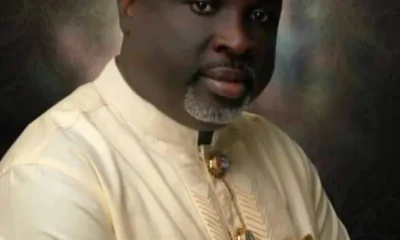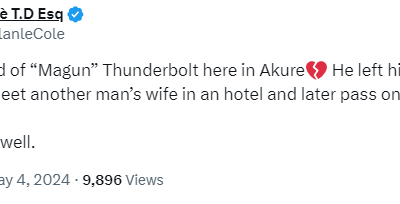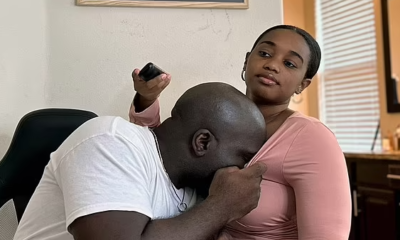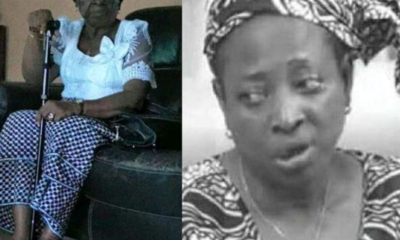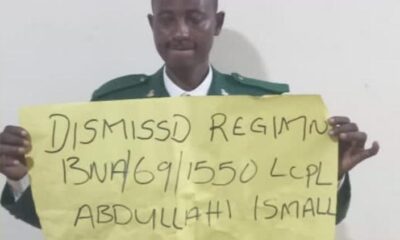News
EFCC Seeks Law To Seize Unexplained Wealth
Published
5 months agoon
By
Editor
The Chairman of the Economic and Financial Crimes Commission, Mr Ola Olukoyede, has called for legislation against unexplained wealth, as a way of checking the criminal activities of treasury looters in the country.
The EFCC spokesperson, Mr Dele Oyewale, in a statement, quoted Olukoyede as making the call at a two-day International Law Conference organised by Christopher University, Mowe, Ogun State.
The theme of the conference was “Unexplained Wealth in the Global South: Examining the Asset Recovery and Return Trajectory.”
Olukoyede said several countries, including the United Kingdom, Australia, Mauritius, Kenya, Zimbabwe and Trinidad and Tobago, had embraced the Unexplained Wealth Orders since it came into force in 2018.
READ ALSO: NANS Slams EFCC’s Claim Of Students’ Engagement In Cybercrimes
He said the EFCC was still relying on the provisions of Section 7 of its Establishment Act to check the menace.
“The issue of unexplained wealth is not a local issue. There are pieces of jurisdictional legislation across the world to tackle it.
“To date, countries of the world are faced with criminalities emanating from money laundering practices and illicit funds. This circumstance led to the promulgation of Unexplained Wealth Orders, that came into force in 2018.
“Several countries, such as the United Kingdom, Australia, Mauritius and African countries like Kenya, Zimbabwe, and Trinidad and Tobago in the Caribbean have come up with UWO. Nigeria is yet to come up with a national legislation on it,” he said.
READ ALSO: Convicted Drug Lord Loses Mansion, Other Property To FG
The EFCC boss, who was represented at the conference by the Abuja Zonal Commander, Assistant Commander of the EFCC, ACE1 Adebayo Adeniyi, emphasised that treasury looters would have little cover if the issue of unexplained wealth was tackled more seriously across the world.
“In Nigeria today, unexplained wealth has become a practical means of tracing, identifying, investigating and prosecuting corruption cases.
“As an anti-graft agency, suspects of any economic and financial crimes are usually required to declare their assets in the course of the investigation.
“The basis for this is to properly establish their true asset base and their linkage or otherwise to any act of corruption.
“Owing to the absence of legislation on the issue of unexplained wealth, the EFCC continues to rely on provisions of Section 7 of its Establishment Act to handle it,” he said.
READ ALSO: EFCC Warns Nigerians Against ATM Swap Fraudsters
Olukoyede said the concerns about unexplained wealth bordered more on asset tracing, investigation and recovery.
“Nations are rapidly settling for non-conviction-based asset forfeiture. The reason for this is simply unexplained wealth can only be beneficial to the state if they are forfeited.
“Since inception, the EFCC has secured sizable assets from fraudsters. They range from houses, vehicles, barges, jewelry, money, furniture items, landed properties, among others,” he said.
Explaining further, the EFCC boss stated that, “procedures for asset forfeiture usually involve the prosecution of the suspected fraudster, as assets may be forfeited on an interim basis or be forfeited permanently, depending on the position of the law and the court.
“However, whether interim forfeiture or permanent forfeiture, what is important is for every ill-gotten wealth to be recovered and kept with the government,” he said.
READ ALSO: Tinubu Violated EFCC Extant Laws Appointing Olukoyede As Chairman, Group Alleges
He urged the public to be forthcoming with information about suspicious assets in their various communities, as the commission would work better only if intelligence and information were readily available.
On the realities of countries in the global south concerning asset recovery, Olukoyede pointed out that countries in the global South were still far away from a culture of public accountability.
“Ethnic and religious biases often stand in the way of full disclosure of information by people in third world countries.
“The implication of this is that anti-corruption agencies can only operate based on the intelligence available to them,” he said.
While talking about the hurdles in asset recovery in Nigeria, Olukoyede punctured the technicality of prosecution of looted assets that sometimes require publication in major newspapers.
READ ALSO: Convicted Drug Lord Loses Mansion, Other Property To FG
“This takes time. Sometimes, the delay may come from some fraudulent claims to frustrate the forfeiture proceedings. In all of these, what is paramount is the facts available to the court.
“At the end of it all, assets are always recovered permanently for the benefit of all.
“Also, recovery of stolen funds stashed in foreign jurisdictions is more complex. Institutions of state are usually involved in the recovery of such funds and this takes far more time and effort, he added.
“The return trajectory involved in this may even take years, and this can be really frustrating to anti-corruption agencies or government institutions involved in the recovery.
“Nigeria is having such instances in the recovery of looted funds by many government officials,“ he said.
You may like


EFCC Trial: ‘Even The Prophets Went To Prison’ – Buhari’s Minister Comforts Self In Court


Ex-Rep Drags Wabote To EFCC Over Disbursement Of Funds For NCDMB Projects In Bayelsa


N2.7bn Fraud: EFCC Arraigns Ex-aviation Minister Daughter Thursday


Naira Abuse: Trouble Looms As Group Petitions EFCC, Wants Edo APC Candidate Prosecuted


EFCC Grills Six Senior NSCDC Officers Over N6bn Fraud


Appeal Court Stops Yahaya Bello’s Contempt Proceedings Against EFCC
News
Bauchi Lawmaker Pledges To Expedite Passage Of Bill On Reduction Of Out-Of-School Children
Published
7 hours agoon
May 10, 2024By
Editor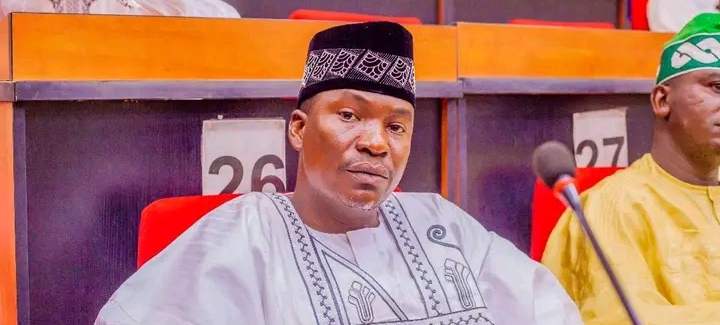
Honourable Nasiru Ala, the Chairman, House Committee on Education in the Bauchi State House of Assembly has pledged to expedite the passage of the state framework Bill to reduce Out-Of-School in the state.
He made the pledge during a two-day regional stakeholders meeting on out-of-school children and retention, transition as well as completion models in Bauchi, Gombe and Adamawa states.
According to him, any moment the bill is sent to the state House of Assembly from the Executive, the lawmakers would expedite actions to ensure that the bill is passed within three to four weeks.
He said: “Based on the law making, we are going to enact this particular law on the domestication of the Bauchi state framework to reduce Out-of-School children bill within three to four weeks from the day of reception from the Executive Arm.
READ ALSO: Bill On Unemployment Benefit Scales Second Reading
“Our governor has been very cooperative and supportive on this particular issue of out of school children because it is a serious menace.
“As an academic, I’m not always happy anytime I hear the word Out-of-School children.
“That is why it’s not going to be a big deal in the Bauchi state House of Assembly to enact the state framework to reduce Out-of-School children in the state.
“In three weeks time In-Sha-Allah, we are going to pass into Bill this State Framework to reduce Out-of-School children in the state”.
READ ALSO: EFCC Grills Six Senior NSCDC Officers Over N6bn Fraud
Also speaking, Mr Raphael Aiyedipe, Education Officer, UNICEF Bauchi Field Office, said that the Universal Basic Education Commission (UBEC) had developed a National Framework of Action to Reduce Out-of-School Children and drive access to education in the country.
According to him, the framework commits to substantially and systematically decrease the number of Out-of-School children in Nigeria by 2030.
He highlighted some of the objectives of the framework to include; improve access and quality of education for all Nigerian children, drive improvement in learning and relevant skills development.
Others, he said, were to accelerate the social and economic development of communities and the country at large.
READ ALSO: NLC, TUC Give NERC Deadline To Reverse Hike In Electricity Tariff
“The Framework has 5 thematic areas that includes; political actors and this means gaining the political will and government commitment.
“Best practices and alternative pathways and this translates to defeating learning poverty, Community accountability, that is engaging stakeholders to build ownership.
“Technology and ICT which means improving access through innovative solutions and Financing mechanisms, that is, reaching the most vulnerable,” he explained.
News
EFCC Trial: ‘Even The Prophets Went To Prison’ – Buhari’s Minister Comforts Self In Court
Published
17 hours agoon
May 10, 2024By
Editor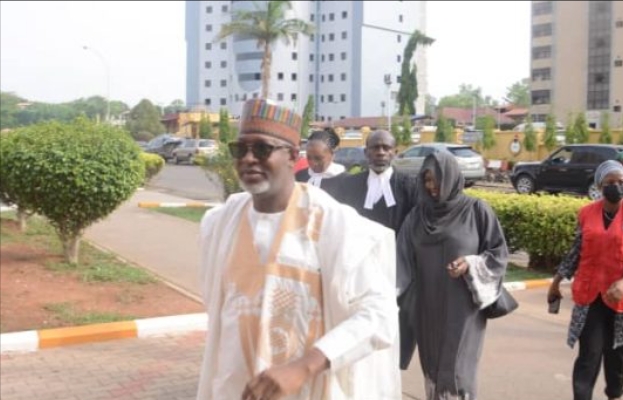
A former Minister of Aviation, Hadi Sirika, standing trial for an alleged N7.2bn fraud, said he was ready to go to prison just like the prophets.
Sirika, his daughter, and three others were arraigned at a Federal Capital Territory High Court on Thursday on a six-count amended criminal charge before Justice Sylvanus Oriji.
A video of the ex-minister speaking in court with his lawyers surfaced on X on Thursday.
In the video, Sirika, dressed in cream Babariga, could be heard saying, “It’s okay. Fatima, it’s okay,” while comforting his daughter.
READ ALSO: Cleric Sets Wife’s House Ablaze For Allegedly Refusing To Participate In Late Night Prayer
He continued, “Even prophets have gone (to prison). Those that went, haven’t they finished theirs already?…whatever Allah says”
The Economic and Financial Crimes Commission had accused the ex-minister, his daughter, son-in-law and Al-Duraq Investment Limited, of fraud in connection with the botched Nigerian Air project.
Meanwhile, the court granted each of the defendants bail in the sum of N100m with two sureties each.
Before the trial judge, Justice Sylvanus Orji granted the bail request of the defendants, they pleaded not guilty to all the charges preferred against them after it was read out to them.
The prosecution counsel, Rotimi Jacobs SAN, had informed the court of an amended charge by the EFCC dated May 7, and filed on May 8, which was not opposed by the counsel for the defendants.
READ ALSO: Bill On Unemployment Benefit Scales Second Reading
Sirika’s lead counsel, Kanu Agabi (SAN), informed the court of his client’s bail application dated May 6.
The other defendants similarly, moved their bail applications and prayed the court to be liberal in the bail conditions.
Jacobs, on his part, told the court that all the defendants were on administrative bail and asked the court to grant bail on the condition that would make them appear for their trials.
Apart from the N100m bail, Justice Osuji added that one of the sureties must own a landed property with valid land titles in like sum within the Federal Capital Territory.
The judge also held that the sureties must depose to an affidavit of means while he barred the defendants from travelling outside the country without its permission.
He added that failure to fulfil the bail conditions would earn the defendants a stay in a correctional facility.
News
Tiktok Bans Nigerian Content Creator’s Account After Completing 24-hour Buried-alive Challenge [VIDEO]
Published
18 hours agoon
May 10, 2024By
Editor
Nigerian man, Young C, has been successfully exhumed after spending 24 hours buried alive in a coffin.
Young C began the challenge on Wednesday, May 8 and has completed it.
At several intervals, Young C gave updates from inside the coffin.
His challenge however led to TikTok permanently banning his account.
READ ALSO: VIDEO: Nigerian Man Exhumed After Completing 24-hour Buried Alive Challenge
After he was ‘’exhumed’, he cautioned viewers against attempting similar stunts due to the inherent dangers involved.
Watch a video of him being exhumed below

Bauchi Lawmaker Pledges To Expedite Passage Of Bill On Reduction Of Out-Of-School Children

Watch Video Of Fuji Musician, Kwam1 That Has Cause Online Debate

EFCC Trial: ‘Even The Prophets Went To Prison’ – Buhari’s Minister Comforts Self In Court
Trending

 Headline4 days ago
Headline4 days agoICYMI: Pandemonium During Church Service As Man Pulls Gun, Attempts To Shoot Pastor [VIDEO]

 Metro4 days ago
Metro4 days agoKidnappers Sleep Off After Abducting Pastor’s Wife, Others In Ondo

 Metro5 days ago
Metro5 days agoMan Dies On Top Of Married Woman In Akure

 Headline3 days ago
Headline3 days agoMother Throws Disabled 6-year-old Son Into Crocodile Infested River [PHOTOS]

 News3 days ago
News3 days ago‘I’m Considering Having 4th Child’ – Mother Of Three Who Breastfeeds Husband , 3 Kids [PHOTOS]

 Business4 days ago
Business4 days agoICYMI: FG Gives Deadline To PoS Operators To Register With CAC

 News2 days ago
News2 days agoThe New Masquerade’ Actress, Ovularia Is Dead

 Politics3 days ago
Politics3 days agoEdo Poll: PDP Gubernatorial Aspirant Resigns From Party

 Headline3 days ago
Headline3 days ago‘Shame On You’- Ugandan Senator Knocked For Showing Off Wooden Bridge He Constructed

 Metro5 days ago
Metro5 days agoSoldier Dismissed For Sleeping With Colleague’s Wife

